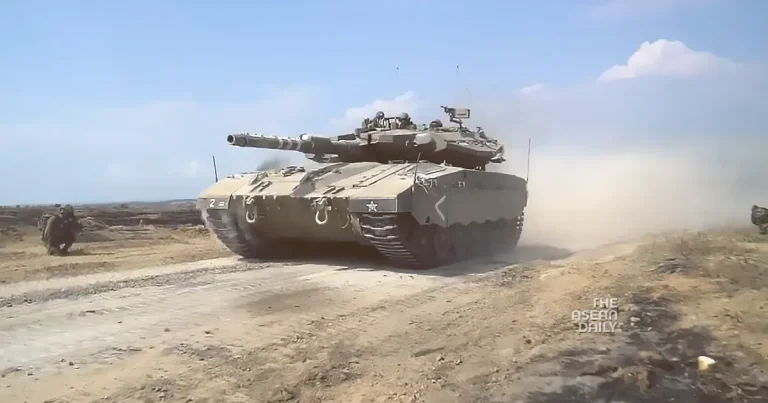15-10-2023 (GAZA) Israel is on the brink of launching a ground assault in the Hamas-controlled territory. The situation has intensified, with Israeli authorities advising Palestinians living in densely populated areas to head south toward the closed border with Egypt.
This grim turn of events comes as a response to a rampage by Hamas fighters a week ago, during which they stormed Israeli towns, resulting in the death of civilians and the capture of numerous hostages. This attack stands as one of the worst instances of violence against civilians in the history of Israel, leading to the loss of approximately 1,300 lives.
The onslaught left Israel shocked and horrified, with reports of atrocities in the towns and kibbutzes that fell to the attackers, accompanied by distressing mobile phone footage. In retaliation, Israeli jets and artillery subjected Gaza to the most intense bombardment it has ever witnessed, imposing a severe siege on the enclave, home to 2.3 million Palestinians.
According to Gaza authorities, over 2,200 people have lost their lives in the conflict, including a quarter who were children, and nearly 10,000 have been wounded. Rescue workers have been working tirelessly to find survivors amidst nighttime air raids.
In response to the imminent threat of an Israeli ground assault, thousands of Palestinians have been fleeing the northern parts of the Gaza Strip. Meanwhile, Israel has continued to strike the area with air raids and has assured the safety of Palestinians fleeing through two main roads.
U.S. President Joe Biden has engaged in diplomacy, contacting Israeli Prime Minister Benjamin Netanyahu to reaffirm unwavering support. Their discussion also touched on international efforts to ensure that innocent civilians have access to essential resources such as water, food, and medical care. President Biden also reached out to Palestinian President Mahmoud Abbas, who emphasized the critical need for humanitarian aid corridors in Gaza.
Despite the severe circumstances, Hamas leader Ismail Haniyeh conveyed that Palestinians would remain in their land, even as it was reported that approximately one million Gaza residents had fled their homes since the commencement of Israel’s bombardment.
In response to these developments, the Israel Defense Forces (IDF) have deployed soldiers and battalions across the country and have heightened their operational readiness for the next phases of the war. This includes significant ground operations encompassing air, sea, and land assaults, expanding the scope of combat, although details remain undisclosed.
On Friday, the Israeli military issued an evacuation order for the northern part of the Gaza Strip, which includes the largest settlement, Gaza City, instructing residents to move south immediately. They have guaranteed the safety of Palestinians fleeing through the two main roads. As the 4:00 PM deadline passed, Israeli troops gathered around Gaza.
Hamas has advised people not to leave, arguing that the exit routes are unsafe. According to Hamas, dozens of people were killed in strikes on cars and trucks carrying refugees on Friday, though these claims remain unverified. Israel contends that Hamas is preventing people from leaving to use them as human shields, an accusation denied by Hamas.
The civilian population in Gaza faces a dire situation, with one neighborhood in Gaza City ordered to evacuate coming under fire from warplanes during the night. Residents have expressed their suffering and reluctance to leave their homes in the face of the intense conflict.
The attacks on Israel have left the nation in deep grief and have spurred preparations for a decisive response. Hundreds of thousands of reservists have been mobilized, and individuals like Avichai Brodetz, whose wife and children were taken captive to Gaza, have set up camps outside the Israeli army headquarters to draw attention to the plight of kidnapped Israelis.
As the conflict persists, it has been reported that Israeli air strikes have killed nine captives, including four foreigners, according to Hamas’ armed wing. Hamas had previously threatened to kill one hostage for every building that Israel strikes without warning.
Despite Israel’s military actions in Gaza, they have been unable to prevent Hamas from launching missile strikes deep into Israeli cities. The only route out of Gaza that is not under Israeli control is a checkpoint with Egypt at Rafah. Egypt officially states that its side is open, but traffic has been halted due to Israeli strikes. The United States is working to open the crossing to allow some people to leave, as 29 U.S. citizens have been killed in the Hamas attacks, with 15 more unaccounted for.
Countries and aid agencies have sent supplies to Egypt but have been unable to bring them into Gaza. Israel maintains that nothing can enter through Rafah without its coordination. The United Nations has expressed concern that relocating so many people within Gaza could lead to a humanitarian disaster.
Simultaneously, deadly clashes have erupted at Israel’s northern border with Lebanon, marking the most intense confrontations since 2006. These developments have raised concerns about the conflict spreading to another front.
Lebanon’s Hezbollah, a close ally of Iran like Hamas, has fired at five Israeli outposts in the disputed Shebaa Farms area with guided missiles and mortar bombs. Israel, in response, has reported lockdowns in five border villages due to a suspected incursion from Lebanon.
To avoid a two-front war, Israel has issued a stern warning to Hezbollah, emphasizing the potential destruction of Lebanon if the conflict extends into the region. The U.S. is also taking measures to prevent the expansion of the conflict, with President Biden issuing repeated warnings against any parties seeking to escalate the situation.




